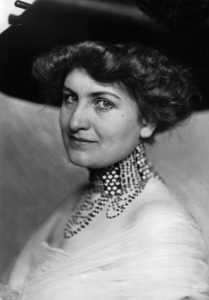
Alma Mahler
Music Period: Romantic, 1930 – 1900
Location: Vienna
Claim to Fame: Composing Lieder earlier in her life and becoming a musical inspiration for Mahler in his final years.
Few realise that Alma Mahler was a composer. However, she was composing in an artistic world dominated by men where the thought of a woman composing music was ludicrous. Alma married three famous men: composer Gustav Mahler, architect Walter Gropius, and German author Franz Werfel. All stifled her artistically, and instead, Alma had to settle for life as a high-class socialite.
Alma was born in 1879 to painter Emil Schindler in Vienna. For most of her upbringing, writers and artists of the highest social class surrounded her, and she enchanted many with her beauty. The simple move of leaning in to conversations to listen intently at dinner parties made her popular. There were probably very few who realised that this was due to deafness in one ear. Of course, not everyone fell under her spell, and Siegfried Lipiner, one of Gustav Mahler’s intellectual rivals, found her “spiteful, vain and overbearing … lacking in warmth, devoid of naturalness, sincerity and good sense”.
When she was twenty years of age, Alma met composer Alexander von Zemlinksy, who was a promising figure in Viennese music. She started receiving composition lessons from him, and the two soon became enthralled in a passionate love affair that would end a year later. Under the guidance of her tutor, Alma composed a series of Lieder to poems by well-known poets.
In 1902, Alma married Gustav Mahler. He was director of the Vienna Court Opera and one of the most powerful men in the musical world at the time. Alma was 22 years old, and already pregnant with their first child. Gustav was nineteen years her senior, and made domestic life for his wife difficult. It was apparent that Alma admired her husband, as she gave up almost everything she held dear for him. Alma stopped composing at his insistence, and led a life of strict regimes away from the dazzling social life she was used to. Gustav explained to Alma that the ‚Äúrole of composer, the worker’s role, falls to me, yours is that of a loving companion and understanding partner‚Äù. However, Gustav seemed to understand he was ‚Äúasking a very great deal‚Äù. Yet, he could ask, and ‚Äúmay do so because I know what I have to give and will give in exchange.” Alma agreed to his terms and offered her husband the support he needed.
The London Review of Books has put together a short video about Alma Mahler and her life:
The ban on Alma’s composing caused problems later in their marriage. Alma complained she would “sit down at the piano, dying to play, but musical notation no longer means anything to me. My eyes have forgotten how to read it. I have been firmly taken by the arm and led away from myself. And I long to return to where I was.” The early attraction to her husband‚Äôs enormous energy, dynamism and childlike innocence was now disappearing into the distance and it becamse clear that Alma never seemed to be ‚Äòin love‚Äô with Gustav.
In 1907, the couple suffered a terrible blow with the death of their five-year old daughter from diphtheria. This was followed by the discovery that Gustav was suffering from a heart defect after a routine examination. Alma became severely depressed soon after. She struggled with the death of her daughter, and started an affair with architect Walter Gropius. Gustav discovered the affair a year before his death in 1911 when Alma’s new lover mistakenly revealed the truth to Mahler.
In desperation, Gustav contacted Sigmund Freud to help mend the rift between them. The result of their meeting saw Gustav focus his attentions on Alma more, and encourage his wife to return to composition. Gustav helped Alma to edit and publish some of her Lieder compositions in 1910. The great composer went on to compose the Adagietto of his Fifth Symphony as a love letter to Alma, dedicated his Eight Symphony to his wife, and then named the first movement of his Sixth Symphony the “Alma theme”. It seems a shame that Alma never liked her husband’s music very much. She had written in her diary that he “thinks nothing at all of my art – and thinks a great deal of his own – and I think nothing of his art and a great deal of my own”.
You can listen to sound clips of Alma Mahler’s music and interviews with the woman herself here.
Out of the hundreds of compositions Alma Mahler wrote, only fourteen survive today. Alma appeared to have lost the will to create anything new after Mahler’s death in 1911, and she received no encouragement from either of her future husbands. Yet performer Sarah Connolly described Alma as having the rare gift of melody. From listening to her music one can hear harmonic twists and turns underneath the vocals that lead us through the dramatic range within her music. The sad reality is that this strong-willed and incredible woman struggled with the social values of society. Alma would, in fact, later alter and falsify letters between her and Gustav before their publication to present the version of herself she wanted people to see. Since then, her reputation as a seductress of Vienna’s cultural high society has seen her music be dismissed by many.
To discover more about Alma Mahler and her life, then check out The Guardian‘s profile and this article in the Chicago Tribune.
-Claire Amundson
Junior Girl
Girl Museum Inc.
